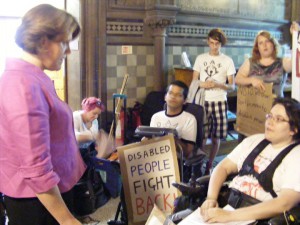Activists corner Minister in Town Hall
Article published: Thursday, June 24th 2010
Protesters from the Disabled People’s Direct Action Network (D.A.N.) hit the streets of central Manchester last Wednesday as part of a national day of action against the Flexible New Deal.
The protests, called by the No to Welfare Abolition coalition, began in Portland Street outside the Beaver House office of A4E, a company contracted by the government to run “workfare” schemes which place benefits claimants into poor-paying temporary work placements. After being tipped-off that Minister for Disabled People Maria Miller was speaking at the Town Hall, the group then headed there, questioning her for 20 minutes after cornering her in a corridor.
Rebecca Young, one of the protest’s organisers, said of the meeting with Miller: “We told her that the jobs that are being produced are quite often meaningless, almost always at minimum wage and occasionally below – under the auspices of ‘training’.
“The whole exercise doesn’t result in a real job with a real working wage. It takes people away from activities in the community such as voluntary work and sends them off to earn next to nothing doing a job that sometimes they can’t actually do for physical or psychological reasons.”
The protesters argued that disability leads to unemployment because of social and systematic problems, not because the disabled cannot or do not want to work. Said Young, “Most people on benefits are on them because there are no suitable jobs for them to do.” Disabled people are currently 7 times less likely to have paid employment, 23 per cent have no qualifications compared to 9 per cent of non-disabled people and the gross hourly pay for disabled employees is £1.22 less on average than a non disabled employee. As many as 7 million people of working age in the UK have a disability.
The protest comes in an increasing climate of hostility towards claimants of incapacity benefits. Chris Grayling, Minister of State in the Department for Work and Pensions, announced last week that by 2014, all 2.5 million incapacity benefits claimants will be removed from the scheme under plans to “crack down on the workshy”.
He told MP’s that claimants will be moved onto other benefits, with stricter requirements to find work. David Cameron pledged during the General Election to test every recipient on their capacity to work, but the piloting of the fitness to work trials in Manchester has proved controversial.
Joe Beech
More: Manchester, News
Comments
-
Is it deliberate or a typo that the article calls the homophobic Chris Grayling “Chris Gayling”?
Comment by Lisa on June 24, 2010 at 4:45 pm -
That was a very Freudian typo, which is now fixed. Thanks for pointing it out.
Comment by tom on June 24, 2010 at 5:21 pm -
Hi All,
It appears such views have accepted by Robert Preston, the BBC Economics editor. Who stated in his blog about taken banks of welfare that, and I quote:
‘See it as the equivalent of moving the long-term unemployed off disability payments and on to a jobseeker’s allowance: it’s a message to the banks that they have to start to prepare for life back in the real world, where all but their short-term unexpected liquidity needs must come from depositors, wholesale creditors and investors.’The innacuracies in the above are to obvious to mention to readers, but morality of comparing people with disabilities to banks who have received billions on finacial to maintain their inflated lifestyles that actually caused the mess we are now in is staggering.
Comment by Shaun Thomas on July 1, 2010 at 2:07 pm
The comments are closed.




